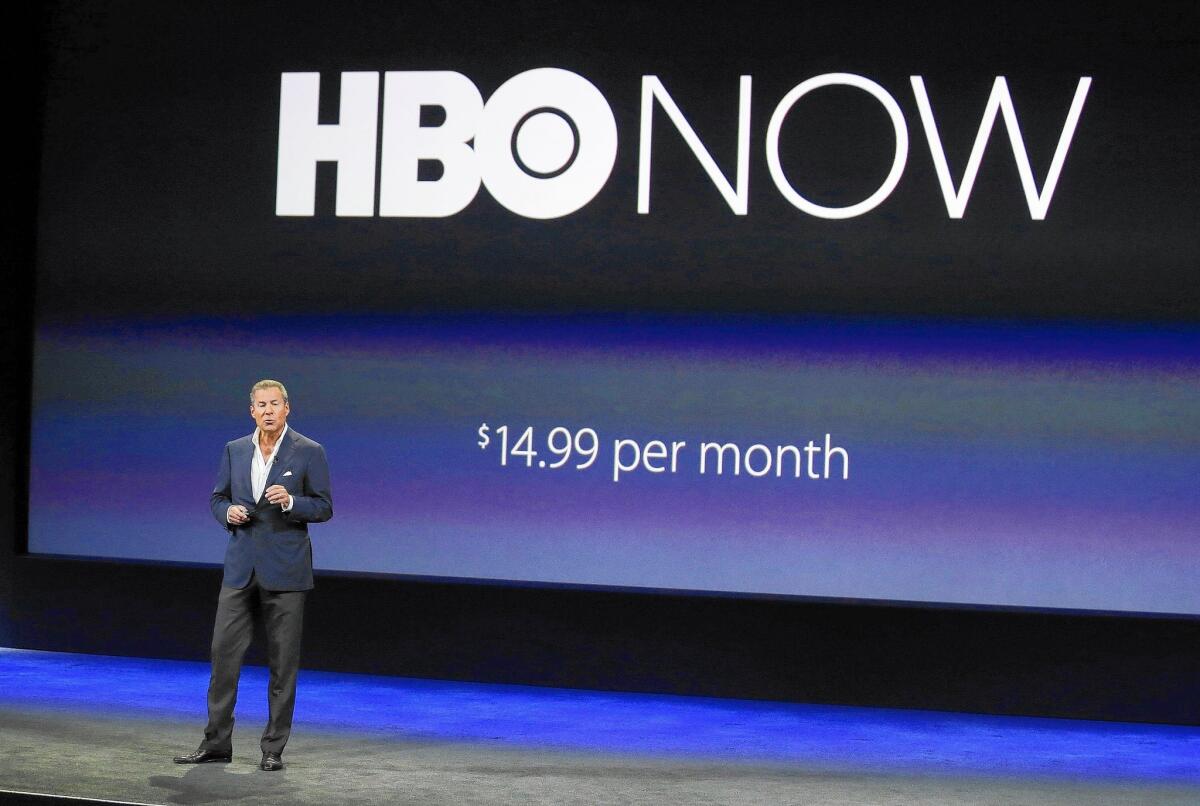Media stocks fall as Time Warner forecast disappoints

Time Warner Inc.’s stock sank 9% on Wednesday after executives gave a lower-than-expected earnings forecast for next year.
Other major media stocks also fell in midsession trading on Wall Street, echoing declines that occurred earlier this summer on fears that the traditional cable bundle will unravel at a faster pace than expected.
Time Warner shares dropped $6.80 to $70.50 a share. The media conglomerate’s executives told investors on a conference call that 2016 earnings would likely be $5.25 a share, which was below what analysts were expecting.
Rupert Murdoch’s 21st Century Fox, which also reported earnings Wednesday, fell $2.11, or 7% to $29.17 a share.
The guidance from Time Warner may again have stoked fears of cord-cutting across the broader media industry.
Time Warner’s Chief Financial Officer Howard Averill told analysts on the call that ratings at the company’s cable networks and Turner network subscriptions had fallen faster than anticipated.
Since the end of 2014, subscribers at Turner’s domestic networks declined about 1% beyond what been predicted. A similar rate of decline is expected in 2016.
In a conference call with analysts, Chief Executive Jeff Bewkes said the company expects adjusted earnings of about $5.25 a share next year. That’s well below the $5.60 a share forecast by analysts, according to Thomson Reuters.
SIGN UP for the free California Inc. business newsletter >>
In addition to bigger than expected subscriber declines, Bewkes cited the effect of less favorable exchange rates as well as expanded investments in programming for the lower earnings forecast.
The company plans to invest aggressively in TV programming and in new digital products in 2016. Bewkes cited HBO’s recent deals with John Stewart and “Sesame Street” and Turner’s plans with WMA/IMG for an eSports League.
“Programming by far remains the most significant area of investment for the company,” Bewkes said. “It’s important our primary focus be on long-term competitive position and growth.”
Walt Disney Co. warned investors in August that profit from ESPN and other cable channels would not be as robust as initially thought because fewer consumers are subscribing to full pay-TV packages. That sparked a wide sell-off of media stocks.
Shares of Disney were down 2.5% in midday trading. Viacom, which owns Nickelodeon and MTV, fell 7%.
Time Warner Inc. owns cable channels such as CNN, TBS, and TNT, plus the pay TV channel HBO and the Warner Bros. movie and TV studio.
Viewership habits have changed in recent year, most dramatically among younger people, the most coveted audience for advertisers.
Many are watching TV shows on their tablets and smartphones or recording them for viewing later. Sitcoms and police procedurals face increased competition from video games, YouTube videos, Facebook, Snapchat and other social media.
Despite Wall Street’s cool reaction, Time Warner actually had better results in the third quarter than analysts predicted.
Time Warner’s third-quarter revenue was $6.6 billion, up 5% from the same period of time last year. Net income was $1 billion, compared to $967 million a year ago.
The revenue growth was driven by HBO and Warner Bros., which had a strong quarter despite struggles at the box office. Revenues increased 15%, driven by growth in television shows such as the new series “Supergirls” and video games.
This post will be updated.
Follow Ryan Faughnder on Twitter for more entertainment business coverage: @rfaughnder
ALSO:
No TV shows canceled? It’s another sign of how the industry is changing
Quentin Tarantino responds to police boycott calls: The complete conversation
Willing to interact with an ad? You can watch some Hulu shows commercial-free if you do
More to Read
From the Oscars to the Emmys.
Get the Envelope newsletter for exclusive awards season coverage, behind-the-scenes stories from the Envelope podcast and columnist Glenn Whipp’s must-read analysis.
You may occasionally receive promotional content from the Los Angeles Times.








